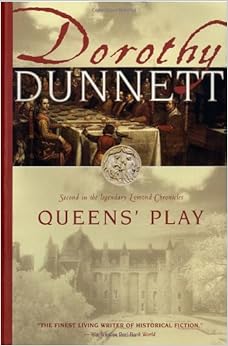 I read the first of the Lymond Chronicles, The Game of Kings, back in early January and reviewed it, sort of, here. Mostly I told you about all of the new words I learned from reading the first in a five volume series about a sixteenth century Scots lord with a loquacious and facile tongue.
I read the first of the Lymond Chronicles, The Game of Kings, back in early January and reviewed it, sort of, here. Mostly I told you about all of the new words I learned from reading the first in a five volume series about a sixteenth century Scots lord with a loquacious and facile tongue.
A couple of months ago I read the second book in the series, Queens’ Play, in which Francis Crawford of Lymond, moves his base of operations from Scotland to France, where he lives a dissolute and adventurous life at the court of Henri II and manages to protect the young Scots princess Mary, who is affianced to the the Dauphin, from numerous assassination attempts, all while drinking inordinate amounts of alcohol and staying drunk for most of the book. Crawford of Lymond is, simply put, amazing.
“On the day that his grannie was killed by the English, Sir William Scott the Younger of Buccleuch was at Melrose Abbey, marrying his aunt.
News of the English attack came towards the end of the ceremony, when, by good fortune, Young Scott and his aunt Grizel were by all accounts man and wife. There was no bother over priorities. As the congregation hustled out of the church, led by bridegroom and father, and spurred off on the heels of the messenger, the new-made bride and her sister watched them go.”
 In this third book, The Disorderly Knights, Lymond becomes entangled with the affairs of the Order of the Knights Hospitaliers, whose headquarters and refuge on the island of Malta is threatened by the Turkish fleet bent on revenge. The Knights of Malta themselves are torn by internal dissension, and the only hero in the whole mess, besides the ever-smiling and accomplished Lymond himself, is Sir Graham Reid Mallett, nicknamed Gabriel, a Scots recruit to the order whose skills and expertise in war and diplomacy rival those of Lymond.
In this third book, The Disorderly Knights, Lymond becomes entangled with the affairs of the Order of the Knights Hospitaliers, whose headquarters and refuge on the island of Malta is threatened by the Turkish fleet bent on revenge. The Knights of Malta themselves are torn by internal dissension, and the only hero in the whole mess, besides the ever-smiling and accomplished Lymond himself, is Sir Graham Reid Mallett, nicknamed Gabriel, a Scots recruit to the order whose skills and expertise in war and diplomacy rival those of Lymond.
After a stirring and tragic (for Lymond’s inamorata, Oonagh O’Dwyer) escape from the Turkish invaders in Tripoli, Lymond and Gabriel both return to Scotland where Lymond puts together a small private army, trained in all of arts of war and intended to keep the peace along the Scottish border on behalf of, but not directly under the orders of, Queen Dowager Mary of Scotland. Gabriel joins Lymond’s merry band ostensibly to train under the great soldier, but also to claim Lymond’s allegiance and soul for God, the (Catholic) Church and the Knights Hospitaliers. Lymond, of course, has other plans for his soul.
Lymond: “What does anyone want out of life? What kind of freak do you suppose I am? I miss books and good verse and decent talk. I miss women, to speak to, not to rape; and children, and men creating things instead of destroying them. And from the time I wake until the time I find I can’t go to sleep there is the void—–the bloody void where there was no music today and none yesterday and no prospect of any tomorrow, or tomorrow, or next God-d— year.â€
Finally, in addition to a fiendishly clever plot and excellent characters and dialog, there are the words. Here are a few more words that I gleaned from The Disorderly Knights:
Fremescent: Becoming murmurous, roaring. “Fremescent clangor.” –Carlyle.
Opaline: of or like opal; opalescent; having a milky iridescence.
Fauve: wild, literally, tawny
Insessorial: adapted for perching, as a bird’s foot.
Coign (quoin): an external solid angle of a wall or the like; cornerstone.
Debouch: to march out from a narrow or confined place into open country, as a body of troops: The platoon debouched from the defile into the plain.
Culverin: medieval form of musket or a kind of heavy cannon used in the 16th and 17th centuries.
Cittern: an old musical instrument related to the guitar, having a flat, pear-shaped soundbox and wire strings.
Simulacrum: a slight, unreal, or superficial likeness or semblance.
Dissentient: dissenting, especially from the opinion of the majority.
Otiosity: being at leisure; idle; indolent.
Pendicle: An appendage; something dependent on another; an appurtenance; a pendant.
Bagatelle: something of little value or importance; a trifle.
Those are just a few of the new-to-me words I encountered in this volume of Francis Crawford of Lymond’s further adventures. The next book (fourth) in the series is entitled Pawn in Frankincense.
QOTD: What is your favorite word? What word(s) do you just like to use because of the sound and meaning and the way the two fit together?